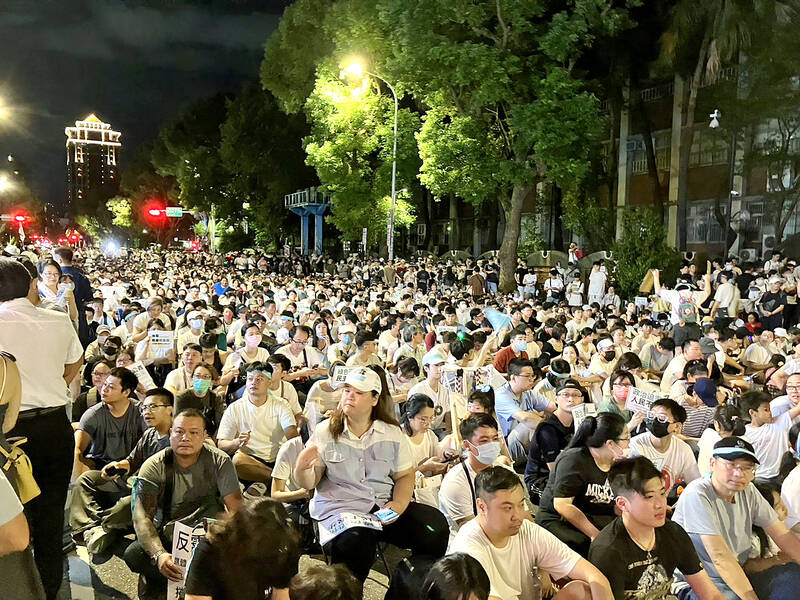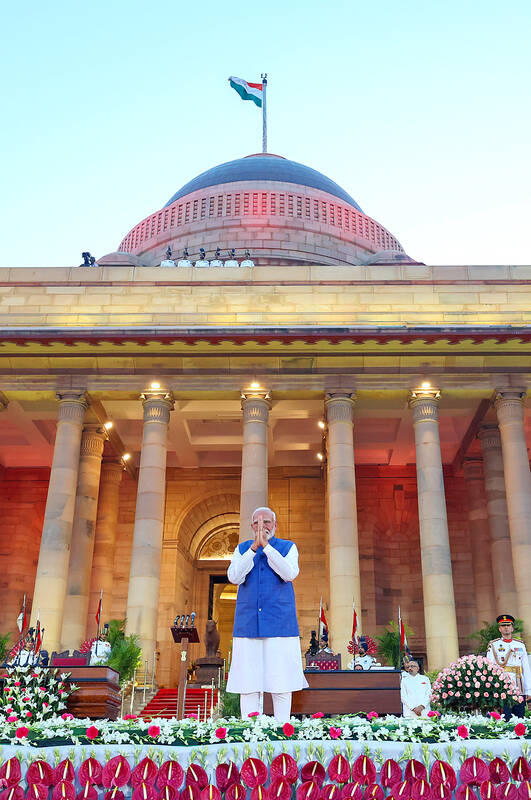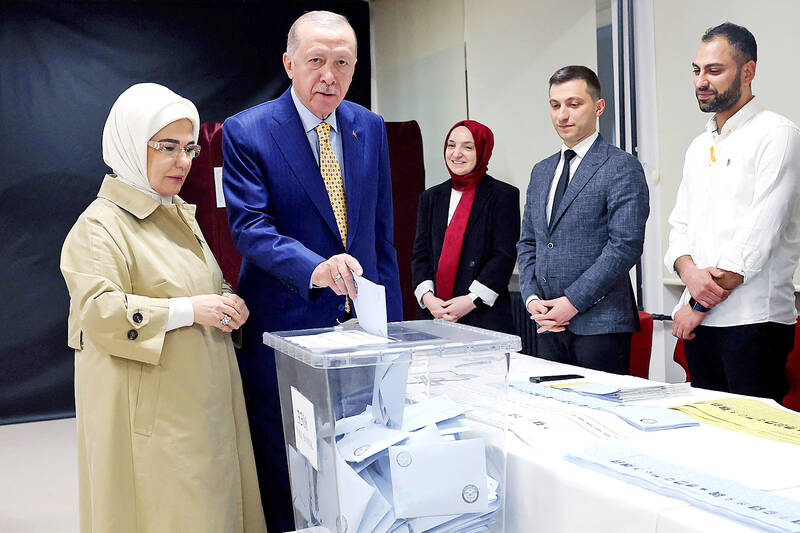Big changes are afoot in global politics, which that are having a big impact on the global order, look set to continue and have the potential to completely reshape it. In my previous column we examined the three macro megatrends impacting the entire planet: Technology, demographics and climate.
Below are international trends that are social, political, geopolitical and economic. While there will be some impact on Taiwan from all four, it is likely the first two will be minor, but the second two will likely change the course of Taiwan’s history.
The re-election of Donald Trump as president of the US embodies many of the big trends shaping the future. He is part of an international populist movement that shares similarities with counterparts around the world, from Hungary to the Philippines, India to Turkey and the MAGA and Brexit movements.

Photo: Wang Kuan-jen, Taipei Times
These movements vary somewhat according to local conditions and culture, but could such a movement arise here?
‘LITTLE SPROUT’ FRUSTRATION
Listening carefully to post-election Trump voter comments among voters from blocs not normally associated with MAGA, one theme is consistent: They were frustrated. Some were frustrated by inflation, others harbored a frustration with the “coastal elites” and government pushing a social agenda, young people were frustrated at the sense that opportunity is getting further and further from their grasp and young men were frustrated with a sense of powerlessness and uselessness.

Photo: EPA-EFE
Some of these issues have animated the “little sprout” (小草) movement backing the Taiwan People’s Party (TPP) and its chairman, the currently incarcerated Ko Wen-je (柯文哲). It is not coincidental that the cries of bias against the state-financed, English-language TaiwanPlus television channel over the correct statement that Trump is a “convicted felon” were pushed heavily by the TPP.
Regardless of whether Trump, and other politicians of his ilk, can actually solve any or all of these issues, they always claim a mandate to shake up the system. Ko originally sold himself as a non-establishment pragmatic, cut-through red tape type of guy, but sounded more anti-establishment in the presidential campaign, making dark insinuations against the Democratic Progressive Party (DPP) and especially its New Tide faction. Watch carefully to see if he picks up more of a strongman persona going forward.
The “little sprouts” are mostly frustrated young people, especially young men. The lack of affordable housing and slow-rising incomes are breeding frustration. Michael Turton’s column “Taiwan’s emerging ‘polycrisis’” published on Nov. 5 explores this in depth.

Photo: AFP
HOW TAIWANESE ARE DIFFERENT
There are three elements of the international populist movements that are not likely to have as much impact here. One is that Taiwanese do not take democracy for granted and are proud of having achieved it, and have integrated being democratic into Taiwanese identity.
Selling a strongman persona might work for a segment of society, but a minority. The mere fear that Han Kuo-yu (韓國瑜) might hold such thoughts in his heart led to a landslide defeat in his presidential run.
Han stated he had no such intentions, but his open nostalgia for the authoritarian era economy and cultural touchstones raised suspicions. Most of his supporters did not doubt his commitment to democracy, and only a minority wanted to return to authoritarianism.
Another is that while not entirely without hiccups or opponents, social change in Taiwan has been far less adversarial and contentious than in many countries. Overseas there are “culture wars” but in Taiwan they are more like “culture skirmishes.”
Taiwanese culture more commonly moves forward in small steps over the long haul rather than in rapid swings and convulsions as is more common in the West. Exceptions occur such as when the Constitutional Court weighs in, but even then society more or less just moves along with the changes.
In some ways Taiwan is relatively liberal, in others conservative. The percentage of women in elected office has risen above 40 percent and the percentage of women in executive positions is also fairly high by global standards, and much higher than other East Asian nations.
Support for marriage equality in polling is high and there was widespread pride when Taiwanese-American drag queen Nymphia Wind (妮妃雅) won RuPaul’s Drag Race. On the other hand, support is scant for legalizing marijuana, ending the death penalty or legal euthanasia.
The third is that while it does exist, science denial is relatively rare and largely confined to the elderly sharing memes in LINE groups. The anti-vaxxers and climate deniers in the international populist movement would not likely get much traction in Taiwan. Taiwanese are proud that students here rank among the highest in science and math testing worldwide.
WHERE TAIWANESE COULD BE SIMILAR
While a full-scale movement like MAGA is unlikely, elements similar to it have already appeared and a movement like the “little sprouts” or something new could build on that — but only to a point. The existing elements have some room to grow and there are some things that Taiwanese could adopt from abroad.
While science conspiracies do not get a lot of traction, political ones often do. As explored in my column “Ko as ‘sacrificial martyr’: the cult-like rhetoric of the TPP and its supporters on Nov. 2, starting in the first week of September conspiracies and cult-like rhetoric moved from the fringes of the “little sprout” movement to the mainstream of the TPP.
To them, Ko is a victim of political persecution. It will be interesting to see if Ko, when released from jail, tries to capitalize on it by claiming martyr status and monetize it like Trump did by selling merchandise adorned with his mug shot. Already Ko followers have likened him to Nelson Mandela, a Boddisatva and called him a “martyr for democracy.”
At the deep ends of the pan-green and especially the pan-blue movements conspiracies abound. A popular one shared by both is that former president Tsai Ing-wen (蔡英文) and the London School of Economics — for reasons never clearly explained — colluded to fake her thesis.
Another element that could play well with some is nativism. This can be played both at the international level with distrust of the US, and towards foreigners locally.
If the US under Trump begins to act erratically and making big demands of Taiwan, it will play right into the segment of the population that already thinks the US only helps Taiwan to rip off Taiwanese with extravagant arms deals. It did not help that RTX (formerly Raytheon) was recently caught inflating their prices in arm sales to Taiwan, though fortunately it was the US government that caught them and ordered them to pay NT$52 billion to Taiwan for doing so.
On the local level there are over 800,000 people classified as “migrant workers” and when foreign-born spouses, foreign students and white-collar workers are included, there are over a million foreigners in Taiwan. So far what little backlash there has been is concerns over foreigners depressing wages or “stealing jobs,” but traditionally Taiwanese viewed themselves in ethnic and ethnonationalistic terms and this is a well that could be tapped into.
Frustration is fueling anti-immigrant hostility abroad and it could here.
Donovan’s Deep Dives is a regular column by Courtney Donovan Smith (石東文) who writes in-depth analysis on everything about Taiwan’s political scene and geopolitics. Donovan is also the central Taiwan correspondent at ICRT FM100 Radio News, co-publisher of Compass Magazine, co-founder Taiwan Report (report.tw) and former chair of the Taichung American Chamber of Commerce. Follow him on X: @donovan_smith.

Oct. 27 to Nov. 2 Over a breakfast of soymilk and fried dough costing less than NT$400, seven officials and engineers agreed on a NT$400 million plan — unaware that it would mark the beginning of Taiwan’s semiconductor empire. It was a cold February morning in 1974. Gathered at the unassuming shop were Economics minister Sun Yun-hsuan (孫運璿), director-general of Transportation and Communications Kao Yu-shu (高玉樹), Industrial Technology Research Institute (ITRI) president Wang Chao-chen (王兆振), Telecommunications Laboratories director Kang Pao-huang (康寶煌), Executive Yuan secretary-general Fei Hua (費驊), director-general of Telecommunications Fang Hsien-chi (方賢齊) and Radio Corporation of America (RCA) Laboratories director Pan
The consensus on the Chinese Nationalist Party (KMT) chair race is that Cheng Li-wun (鄭麗文) ran a populist, ideological back-to-basics campaign and soundly defeated former Taipei mayor Hau Lung-bin (郝龍斌), the candidate backed by the big institutional players. Cheng tapped into a wave of popular enthusiasm within the KMT, while the institutional players’ get-out-the-vote abilities fell flat, suggesting their power has weakened significantly. Yet, a closer look at the race paints a more complicated picture, raising questions about some analysts’ conclusions, including my own. TURNOUT Here is a surprising statistic: Turnout was 130,678, or 39.46 percent of the 331,145 eligible party

The classic warmth of a good old-fashioned izakaya beckons you in, all cozy nooks and dark wood finishes, as tables order a third round and waiters sling tapas-sized bites and assorted — sometimes unidentifiable — skewered meats. But there’s a romantic hush about this Ximending (西門町) hotspot, with cocktails savored, plating elegant and never rushed and daters and diners lit by candlelight and chandelier. Each chair is mismatched and the assorted tables appear to be the fanciest picks from a nearby flea market. A naked sewing mannequin stands in a dimly lit corner, adorned with antique mirrors and draped foliage

The election of Cheng Li-wun (鄭麗文) as chair of the Chinese Nationalist Party (KMT) marked a triumphant return of pride in the “Chinese” in the party name. Cheng wants Taiwanese to be proud to call themselves Chinese again. The unambiguous winner was a return to the KMT ideology that formed in the early 2000s under then chairman Lien Chan (連戰) and president Ma Ying-jeou (馬英九) put into practice as far as he could, until ultimately thwarted by hundreds of thousands of protestors thronging the streets in what became known as the Sunflower movement in 2014. Cheng is an unambiguous Chinese ethnonationalist,